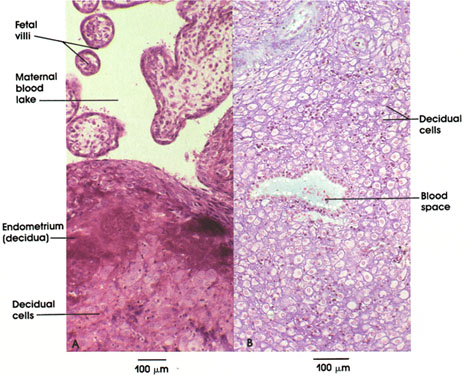

Plate 13.260 Placenta
Ronald A. Bergman, Ph.D., Adel K. Afifi, M.D., Paul M. Heidger,
Jr., Ph.D.
Peer Review Status: Externally Peer Reviewed

A. Human, 10% formalin, H. & E., 89 x.
B. Human, Bouin's-Halmi's AFT, 107 x.
The maternal component of the placenta is shown in A; the endometrium of pregnancy is termed the decidua, and the stromal cells, which differentiate during pregnancy, are termed decidual cells. They are shown in profusion in B. Decidual cells are polygonal, possess a large, vesicular nucleus, and demonstrate the electron- microscopic characteristics of secretory cells; they are imputed to be the source of placental prolactin. Note the finger-like incursion of the maternal blood space into the substance of the decidua. This space is lined with trophoblastic epithelium (see Plate 259).
Next Page | Previous Page | Section Top | Title Page
Please send us comments by filling out our Comment Form.
All contents copyright © 1995-2025 the Author(s) and Michael P. D'Alessandro, M.D. All rights reserved.
"Anatomy Atlases", the Anatomy Atlases logo, and "A digital library of anatomy information" are all Trademarks of Michael P. D'Alessandro, M.D.
Anatomy Atlases is funded in whole by Michael P. D'Alessandro, M.D. Advertising is not accepted.
Your personal information remains confidential and is not sold, leased, or given to any third party be they reliable or not.
The information contained in Anatomy Atlases is not a substitute for the medical care and advice of your physician. There may be variations in treatment that your physician may recommend based on individual facts and circumstances.
URL: http://www.anatomyatlases.org/